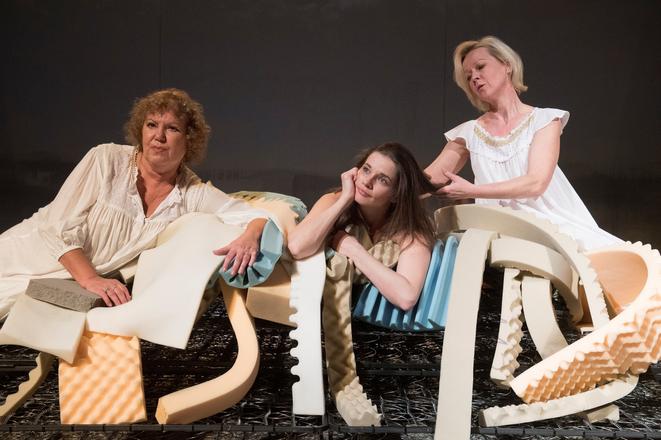It was a Sunday evening in the small, remote village of Malá Franková, nestled in the Kežmarok district of eastern Slovakia. Roughly a hundred spectators gathered to enjoy an outdoor performance by the National Theatre of Košice at the local amphitheatre. The show, “Little Gem” — an acclaimed Irish play by Elaine Murphy — tells the stories of three generations of women grappling with life, love, and sexuality. But what was meant to be an evening of culture turned into a spectacle of disruption.
The peace was shattered when Štefan Kuffa, a deputy environment minister and far-right nationalist appointed by the Slovak National Party (SNS), strode in front of the audience. Three-quarters of an hour into the play, he attempted to halt the performance, declaring it inappropriate for the crowd, which included children.
Lukáš Marhefka, the editor-in-chief of Zamagurské noviny, a local paper, was among the audience members. He was the first to bring the incident to light. “People asked Kuffa to leave because they couldn’t see the stage,” Marhefka said in a video. Instead of stepping aside, Kuffa launched into a tirade, addressing the crowd about who should — and should not — be watching the play. He even likened the performance to pornography. Tempers flared, leading to a heated argument and the abrupt interruption of the performance.
“It’s unbelievable,” Marhefka said. “He single-handedly disrupted the performance of actress Dana Košická.”
The play was part of a hunting event held in the village last Sunday.
Theatre critical of Kuffa
The play in question, “Little Gem”, premiered in 2008 and has garnered widespread acclaim, including an award at the prestigious Edinburgh Fringe Festival. Its exploration of love, death, and intimacy through the voices of three women — granddaughter, mother, and grandmother — seemed to have struck a particularly sensitive chord for Kuffa. One monologue, delivered by actress Ľuba Blaškovičová as the grandmother, candidly reflects on a friend’s advice to visit a sex shop to reignite her passion for life. It was during Košická’s salsa-related monologue that Kuffa chose to intervene.
Kuffa has since denied Marhefka’s account, yet in an official statement, he admitted to disrupting the play. “I acted in good faith to prevent the performance containing perverse scenes, targeted solely at adults, from continuing in front of our children,” he said on Facebook.
Blaškovičová responded by comparing Kuffa to a censor.
The National Theatre of Košice defended its production, noting that the play is clearly marked as suitable for viewers aged 18 and over on its website. However, festival organisers had failed to communicate this to the audience, leading to an apology to the theatre from the event organisers. Nonetheless, the theatre stood by its stance that “the situation did not justify anyone interfering with the performance or ejecting the audience from the cultural event.” It further emphasised that it is the responsibility of parents, not organisers, to decide what content is appropriate for their children.
The performance eventually resumed, though no longer in the original amphitheatre. After Kuffa was escorted away by the village’s mayor, Milan Kalafut, the play continued in an alternate venue offered by the organisers.
Like Kuffa, who comes from Malá Franková, Kalafut criticised the play, and called it unsuitable for the conservative local community following the incident.
Kuffa’s provocation
Kuffa’s intervention, however, extended beyond the performance itself. Late in the evening, while theatre staff dismantled the set, Kuffa reappeared with his phone in hand, filming the workers. This encounter ended with a brief physical altercation, after a staff member struck Kuffa’s hand with a metal rod. Kuffa later posted a video of the incident online, sparking an ongoing police investigation.
The Malá Franková incidents have rippled through Slovakia’s political sphere. While opposition parties have called for Kuffa’s resignation, Slovak National Party chair Andrej Danko denounced the assault on Kuffa by the theatre worker.
Meanwhile, a commenter on social media claimed that Kuffa had harassed and insulted the theatre troupe throughout the day.
Minister wants an investigation
The Culture Ministry also weighed in, siding with Kuffa.
“Children and youth must be protected from inappropriate content and from the persistent pressure of liberal-progressive propaganda,” Culture Minister Martina Šimkovičová (SNS) stated. She described the play as “far beyond the bounds of what is suitable for children and youth”, citing both its sexual content and language.
There is no confirmation as to whether Šimkovičová herself saw the production. However, Denník N, a prominent Slovak daily, reported that the minister used a photograph from a different staging of the play “Little Gem”, involving a sex toy, to publicly criticise the national theatre and the play itself on social media. The image, although related to “Little Gem”, was taken from a rendition at the Bratislava-based theatre L+S.
Šimkovičová has faced criticism for purging cultural institutions, attacking the LGBT+ community, and attempting to consolidate control over cultural funding in an effort to reshape Slovakia’s cultural landscape.
The minister has since announced plans to investigate whether the performance in the village of Malá Franková violated laws regarding the moral protection of minors. Additionally, Environment Minister Tomáš Taraba (SNS) has expressed hopes that General Prosecutor Maroš Žilinka will also look into the matter.
Kuffa’s actions mirror a similar incident in 2016, when far-right politician Marian Kotleba halted a theatre performance due to its coarse language.


